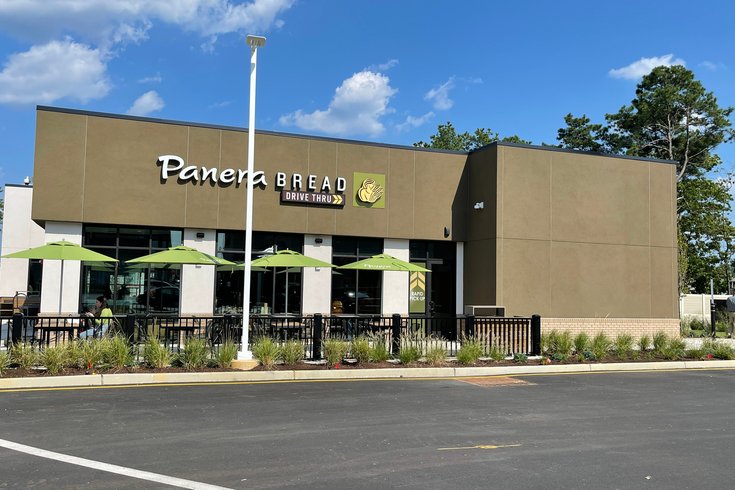
October 24, 2023
 David P. Willis/USA Today
David P. Willis/USA Today
The family of 21-year-old University of Pennsylvania student Sarah Katz claims Panera Bread's Charged Lemonade drink contributed to her death after she drank the highly caffeinated beverage last year. A Panera Bread store is shown above in Brick Township, New Jersey.
A University of Pennsylvania student suffered a fatal heart attack last year after she drank a highly caffeinated lemonade from Panera Bread, according to a lawsuit her family filed against the restaurant chain.
Sarah Katz, 21, of Jersey City, died Sept. 10, 2022 at Penn Presbyterian Medical Center not long after she drank a "Charged Lemonade" drink at a Panera Bread location in West Philadelphia. She went into cardiac arrest twice before her death, which her parents claim could have been avoided if Panera labeled the drink's contents more clearly.
In the lawsuit, filed Monday in the Philadelphia Court of Common Pleas, Katz's parents explain that their daughter was diagnosed with long QT syndrome when she was five years old. People with the condition can have abnormal heart rhythms and electrical activity due to stress or heavy exercise. The disorder typically can be managed with medication, but consuming caffeine in high amounts can cause dangerous spikes in heart rate.
Katz, a junior at Penn studying international relations, had been managing her condition for years and had avoided highly caffeinated drinks her entire life, the lawsuit says. She had visited her doctor twice last year for check-ups that found normal test results for her heart.
The 26-page wrongful death lawsuit claims Panera's menu failed to properly indicate that the Charged Lemonade drink was highly caffeinated and also contained high amounts of sugar.
Panera's Charged Lemonade has 260 milligrams of caffeine in a regular-sized 20-ounce drink and 390 milligrams in its large 30-ounce drink, according to the company's website. The lawsuit states the caffeine content of Charged Lemonade is higher than any other drink on Panera's menu, and that the beverage also has the stimulant guarana extract and nearly 30 teaspoons of sugar.
For comparison, the lawsuit notes that a 12-ounce Red Bull energy drink has 114 milligrams of caffeine and a 16-ounce Monster Energy drink has 160 milligrams of caffeine.
At the Panera location in West Philly where Katz bought the drink, her family contends that Charged Lemonade was listed alongside all other beverages and was not clearly labeled as an energy drink. The store in West Philly advertised it as a "plant-based and clean" beverage with as much caffeine as a dark roast coffee, according to the lawsuit. This language also appears on the company website, though the lemonade is described as "the ultimate energy drink" online.
Katz had been part of Panera's Unlimited Sip Club, a monthly membership plan that includes unlimited drinks, the lawsuit says. She had tried Charged Lemonade at least once before, but was not aware of how much caffeine the drink contained, her roommate and friend, Victoria Rose Conroy, told NBC News.
“She was very, very vigilant about what she needed to do to keep herself safe,” Conroy said. “I guarantee if Sarah had known how much caffeine this was, she never would have touched it with a 10-foot pole.”
Hours after Katz drank the Charged Lemonade on Sept. 10, she collapsed during a birthday gathering for a friend at a restaurant in Philadelphia. A medical examiner's report determined the cause of her death to be cardiac arrhythmia due to long QT syndrome. Caffeine was not noted as a contributing factor, but the report states Katz had no other drugs in her system other than what she had been given at the hospital.
The lawsuit claims Panera "engaged in negligent, reckless, intentional, fraudulent ... and/or outrageous misconduct." The family is seeking compensatory and punitive damages.
Since 2011, Katz had served as a Red Cap Ambassador with the American Heart Association, conducting CPR training in high schools and underserved communities, according to a statement shared by the university. She had also worked as a research assistant at the Children's Hospital of Philadelphia and urged Pennsylvania lawmakers to pass a bill requiring all schools in the state to become "heart safe" spaces. Last fall, she had started a health communications internship with the U.S. Centers for Disease Control & Prevention.
“We are devastated by this tragic passing of our beloved Sarah. She loved the University of Pennsylvania so much and was so happy and thriving," Katz's family said in a statement to the university. "Sarah was fully engaged in so many aspects of campus life, academics, clubs, socially, and through internships. Words cannot express how much of a loss we are feeling. We so appreciate everything.”